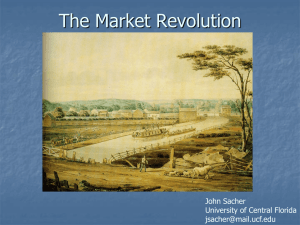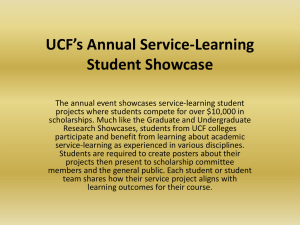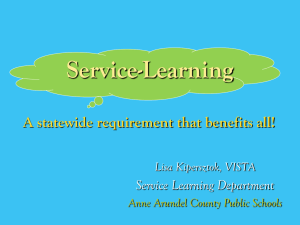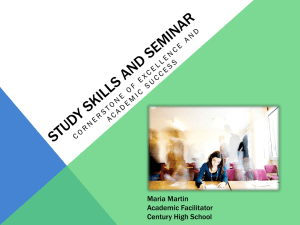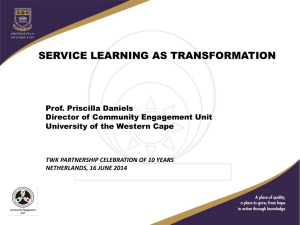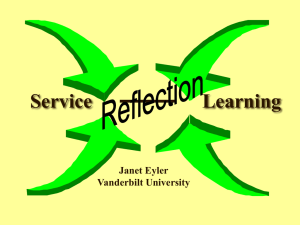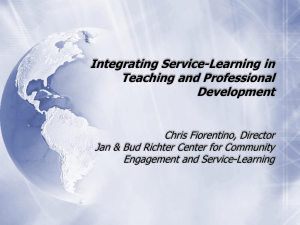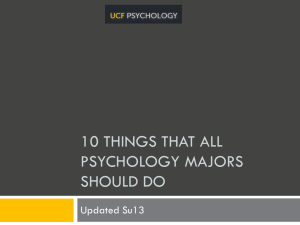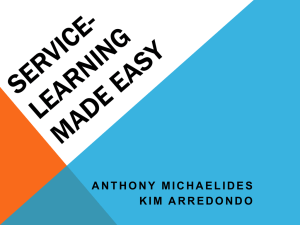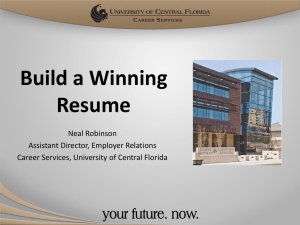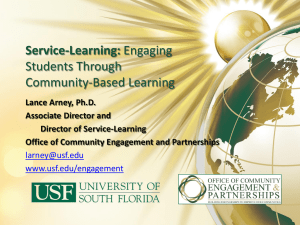2014 Student Showcase Award Recipients and Sample Projects
advertisement
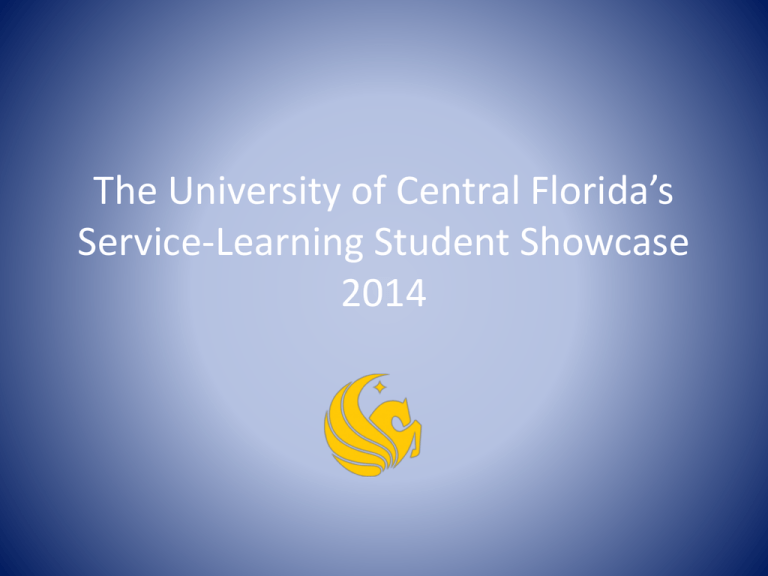
The University of Central Florida’s Service-Learning Student Showcase 2014 The annual event showcases service-learning projects where students compete for over $12,000 in scholarships. Much like the Graduate and Undergraduate Research Showcases, students from UCF colleges participate and benefit from learning about academic programming experienced in various disciplines. Students are required to create posters about their projects then present to scholarship committee members and the general public. Each student or student team shares how their service project aligns with course objectives, the value to the community, and fosters civic responsibility. Service-Learning Student Showcase Scholarships ($100-$1000 each) Through the generosity of UCF’s Student Government Association, Colleges, Interdisciplinary Studies, and the Office of Experiential Learning over $12,000 in scholarships were awarded in 2014 to service-learning projects presented at the showcase. The scholarship awards include: Excellence in Graduate Engagement Innovative Project Youth Development Capacity Building Pedagogical Value Quality of Display Caliber of Reflection Sustainability •Environmental Sustainability •Economic Sustainability •Social Sustainability Excellence in Graduate Engagement Excellence in Undergraduate Engagement Significant Impact Literacy Engagement Value to Agency Enhancement of Civic Responsibility Leadership Peer Choice The Office of Experiential Learning Award & Scholarship Students also receive Recognition Awards for Excellence for the following: Non-Traditional Literacy Engagement Social Justice Technological Integration Engaging the Arts Engaging Community Online STEM (Science, Technology, Engineering, Mathematics) 11th Annual Service-Learning Student Showcase Winners 2013 Non-Traditional Literacy Engagement Recognition Award The award recognizes a project that goes beyond the traditional thinking of “reading and writing” to include use of media, nontraditional texts (i.e., magazines, comic books, social networking, technology, drawings and the like), music, oral discovery, and other “texts” that promote a complex understanding of literacy. Language Domination Marjorie Jefferson and Natalie Bernstein Course: SPA 6417 Cognitive Communicative Disorders Faculty Members: Dr. Anthony Pak Hin Kong Community Partner: Share the Care-Oviedo College of Health and Public Affairs Our service-learning project involved the Share the Care organization, which is a senior center that specializes in cognitively designed social and therapeutic activities. The organization provides services, education, training, and family or caregiver support. The participants were clients who attended the Share The Care Oviedo facility. All participants were actively involved in building their memory book. Pictures were added after determining which ones held the most significance for each client. A memory book is a direct intervention tool used to facilitate the individual’s memory when memory loss progresses due to the disease process. It provides a record of the client’s personal history and can provide the client with the sense of self and self-identity (Bourgeois, 1992). Our sample size included eleven individuals at initiation and six remaining at final evaluation. The agency was receptive to the project and participated actively. Interpreters were used for clients with linguistically diverse backgrounds. The project relates specifically to the course learning objectives in several ways. Knowledge of the etiologic factors associated with dementia assisted with creating the appropriate intervention tool. Knowledge of culturally linguistic differences provided us with the opportunities to communicate with different populations and provide effective intervention. Finally, activities were structured for optimal enhancement of the memory processes for individuals with cognitive-communicative disorders. Reference: Alzheimer's Arkansas. (2014). Retrieved 1 31, 2014, Making the most of memories: Creating memory books and activity kits : www.alzark.org Social Justice Recognition Award The award recognizes a project that addresses issues based on ideas concerning equality, human rights, and the recognition of dignity in every human being. The project will reveal that a significant change of world view has occurred for the student(s) involved in the project and also address next steps- even small ones!- in addressing how to solve the issues at hand. Solidaridad Campesina Nataly Azcurra and Sandra Almanza Course: WST 3015 Introduction to Women’s Studies Faculty Members: Meredith Tweed Community Partner: YAYA-Youth and Young Adult Network of the National Farmworker Ministry College of Arts & Humanities YAYA is a collective of individuals that stands in solidarity with farm-worker communities and farm-worker led campaigns. Through our service-learning experience we aimed to not create a solution to the many problems faced by an already marginalized group but to work towards a solution that aligns itself with the needs already set in place by these farm-worker led organizations. We strived to meet community needs by listening to what these campaigns wanted. These events include the organizing of community gardens and the coordination of events for Farm Worker Awareness Week which runs from March 23rd - 29th. Issues faced by farm-worker women are example of intersectionality, such as issues of class, race, gender, and immigration status. These women encounter problematic issues of sexual harassment on the job and exposure to pesticides on the field that dramatically alter the health of their children, when these women are pregnant and working. All these issues identify with the course objectives by integrating the women's experience of an "awareness of diversity…across differences in culture…." (Tweed). Through our involvement we hope to impact a number of about twenty people through our service work and advocacy. Estimated participation at the events held during Farm-Worker Awareness week will be an anticipated twenty participants at each event. For the events that will directly work with farm-worker communities, such as the Community Garden, we will be directly impacting the community as whole and will be able to properly analyze the outcome at the end of this current week. Citation: Tweed, Meredith. Introduction to Women’s Studies Syllabus. 2014. Women’s Studies Dept., University of Central Florida, Orlando, FL. Technological Integration Recognition Award The award recognizes most effective use of technology to help implement the project. Team Manor Care Venita Freia, Meghan Ostema, and Lindsey Cultrera Course: SPA 6417 Cognitive Communicative Disorders Faculty Member: Dr. Anthony Pak Hin Kong Community Partners: ManorCare Nursing & Rehabilitation Center-Winter Park College of Health and Public Affairs A speech and language intervention tool, developed by graduate students enrolled in the University of Central Florida (UCF) Master of Arts in Communication Sciences and Disorders program, was introduced to approximately 10 adults residing in a skilled nursing facility who presented with a variety of cognitive-communicative disorders. The present project examined the effects of using a comprehensive intervention tool to treat a range of clients across linguistic environments. During preparation and delivery of the project materials, students sought to meet the following course objectives: a) incorporating methodology in the assessment of individuals with cognitive-communicative disorders and b) synthesizing various evidenced-based approaches and methodologies to design appropriate treatment plans. Following the trial intervention period, a brief questionnaire and 5-point rating scale were provided to the supervising speech-language pathologist (SLP) to determine the effectiveness, quality, and appeal of the tool, as well as the response types that can be elicited when working with a variety of individuals. Results of the questionnaire and clinical observation revealed this tool is effective in a) eliciting visceral responses and memory/word recall, and b) increasing spontaneous speech, client motivation, and utterance length. Although the population size was relatively small, the intervention tool was presented to adults who represent a wide range of ages and communicative disorders (e.g. dysarthria, aphasia, dementia). Given the SLP’s reported satisfaction on the rating scale, it is hypothesized that this project will serve an even greater number of individuals at the facility with continued use of the proposed intervention tool. Approximate Impact Numbers: 10 Engaging the Arts Recognition Award The student(s) incorporates elements of the arts to enhance overall success of the service-learning project. Thinking Global and Acting Local Grace Parker, Gabrielle Casey, Ofelia Sanchez, Ashley Anderson, Kathryn Stout, Heather Bryan, and Adriana Velado Course: WST 4415 Global and Transnational Feminism Faculty Member: Meredith Tweed Community Partners: Catholic Charities of Central Florida and Zonta International College of Arts & Humanities Our service project consists of activism on a local and global scale. First we partner with Catholic Charities of Central Florida to provide a fun day of food, arts and sports for resettled refugee families in the local area. Additionally we will partner with Zonta International to hold an educational fundraiser about survivors of domestic abuse in Rwanda with a speaker and video presentation. The goal of our project is to both address local refugee’s needs for inclusivity, positive community and support, and to increase awareness about the struggles of Rwandan women. Just as our Global and Transnational Feminism coursework draws connections between local and global elements of women’s issues and activism, our project showcases the transformative power of women and communities in building solidarity and social change. We strive to put our knowledge into action as we deconstruct and rebuild what it means to enact global feminism, build community, and theorize women’s lives and roles in our globalized world. Engaging Community Online Recognition Award The award recognizes a service-learning project that occurred in an online course and was successful in both aligning project with course curriculum and enhancing service needs with community partner(s). The Wanna Bees Hannah Perkins, Surisadai Hernandez, Henry Henderson, Susannah Austin, Olivia Keene, and Alexander Lee Griffel-Dalager Course: ENY 5006C Entomology Faculty Members: Dr. Hojun Song and Derek Woller Community Partners: Carillon Elementary School 5th grade class and the Orlando Public Library College of Sciences Service –learning is about extending beyond the typical classroom experience, learning to engage the public and have an impact on the community. Dr. Song encouraged this same type of learning through Entomology, leading our group, The Wanna Bees, to teach 5th grade students at Carillon Elementary School and the general public through the Orlando Public Library about the amazing world of insects. Through PowerPoint, hands on activities, dances, live insects, and costumes, our group was able to present the importance of insects, especially bees, to children and their parents in a fun and interactive way. The 5th grade class was given pre-tests and post-tests to determine their knowledge about insect familiarity, bee caste systems, social/solitary insects, and overall bee importance. After our presentation, learning gains were made in all four categories! The library was not part of our syllabus, but we were so inspired by our results at the elementary school that we chose to share our presentation with the general public as well. Nothing compares to seeing a live insect up close and learning why we should appreciate it, even if it is roach. Our group learned through this experience as well, putting our class lessons into practice by learning how to teach the community about science in a more down-toearth way! Too often science is overlooked by the general public for its difficulty to understand. However, when The Wanna Bees put on their bee costumes, we are not easy to overlook and learning becomes fun! Approximate Impact Numbers: ~40 total (both locations) STEM (Science, Technology, Engineering, Mathematics) Recognition Award The award recognizes a project that enhances the understanding of science, technology, engineering and/or mathematics (STEM) by enhancing communication abilities and learning outcomes/understanding of concepts required in these disciplines. The Shifting Shorelines Carl Lewis, Steven A. Carrion, Ellis D. Hartley, Michelle Pena-Ortiz, Peter C. Gonzalez, and Keith M. Brinsko Course: BSC 4312 Marine Biology Faculty Member: Dr. Linda Walters Community Partner: Sunrise Elementary School, Orange County College of Sciences Marine conservation and restoration are essential in preserving the biodiversity in our coastal waters. It is important to educate future generations on these topics in an engaging and understandable way. For our service-learning project in Marine Biology (BSC4312), our objective was to educate two classes of 5th graders from Sunrise Elementary School on the importance of protecting the guardian of our shoreline, the marshgrass Spartina alterniflora. In order to do this, we designed an activity for the children to discover Spartina alterniflora’s wide range of essential services to the ecosystem and to humans, including sustaining the populations of commercially important species and preventing land loss. In our class activity, students were given a scenario that results in the disappearance of Spartina alterniflora. The students were presented with different suspects, consisting of several marine organisms and waves. The students learned Spartina alterniflora’s effect on various marine animals through their interrogations of the suspects. The students eventually made it to the conclusion that waves were responsible for the disappearance of Spartina alterniflora. Afterwards, the students were given the opportunity help pot cuttings of Spartina alterniflora that will be used in community shoreline restoration during the summer of 2014. This demonstrated to the children the effect they can have on their environment as well as possibly inspired some students to continue on the path of marine biology. Through our experiences we too learned not only about environmental concerns, but also how to communicate these concerns effectively to a wider range of people. Approximate Impact Numbers: 42 fifth graders and their parents as well as an unknown number of people affected by our restoration efforts. Pedagogical Value Scholarship ($100) Apparent pedagogical value of the project; the degree to which the project is clearly integrated into the course or advances the course objectives. Each student is asked to provide a copy of the course syllabus. What is the linkage between the SL project and the course objectives? The Lounge Lizards Greg Norris, Heather Xiong, Antonio Ulivella, Alexandra Consuegra, Anna Jenkins, and Jacquelyn Weaver Course: BSC 4312 Marine Biology Faculty Member: Dr. Linda Walters Community Partner: Galileo School, Seminole County College of Sciences Whose Reef Is It Anyway? There is a disconnect between the ecological services that are provided by Florida’s ecosystems and public knowledge of these essential services. A primary emphasis of our Marine Biology (BSC4312) class is effectively communicating science to those who may not be familiar with ecological services, especially in marine systems. The objective of our project was to communicate this topic with two classes of second grade students at Seminole County’s Galileo School for the Gifted. We addressed ecosystem services provided by oysters. Specifically, we focused on feeding ecology between oysters and wading birds of the Indian River Lagoon. We presented our students with the opportunity to explore the different organisms in the Indian River Lagoon with: 1) live animals in touch tanks, 2) a basic exploration of ecological terms and marine biodiversity, and 3) a chance to discover the purposes of different wading bird beaks during an in class demonstration with a presenter dressed as a bird. The teacher provided the students with a foundation of basic ecology prior to our visit. This foundation, along with our elaboration on the feeding ecology between birds and oysters, allowed our students to walk away with a clear understanding of the ecological services provided by these organisms in the Indian River Lagoon. Through this project we were able to enhance our scientific communication skills, our confidence in communicating to a public audience, and our impact on the local community. Quality of Display Scholarship ($100) Quality of the display: clarity, impact, intellectual stimulation, interest and creativity. How well does the display explain the project and its impact? Is it an interesting and creative presentation? Battle for the Crown Evan Klemen, Adam Handley, Anthony Cuminale, Sarh Huff, Amanda Aull, Jordan Filipponi, Emily Curtiss, Courtney Buck, Adrien Izquierdo, and Chelsea Landau Course: BSC 4312C Advanced Marine Biology Faculty Member: Dr. Linda Walters Community Partners: Ms. Tricia Lachance, Sunshine Elementary & Ms. Mary Lynn Hess, Goldsboro Elementary College of Sciences Conservation efforts of Florida’s Mosquito Lagoon have been in progress for years, yet few in the community know of the perils faced by our local marine ecosystem. Our objective was to educate future conservationists on the need to protect Mosquito Lagoon, because, without outreach, its fate is ominous. We targeted one factor that might inhibit oyster reef conservation- the recent huge increase in abundance of the predatory crown conch, Melongena corona. Our audiences were Ms. Hess’ class of 28 students at Goldsboro Elementary (Seminole County) and Ms. LaChance’s 22-student class at Sunrise Elementary (Orange County). Using interactive games and demonstrations that we designed, we communicated concepts such as optimal foraging theory, conch anatomy, biodiversity, and the scientific method. To test each student’s comprehensive learning, we administered a pre-test and posttest that indicated significant improvement after our classroom visits. These results illustrate that we effectively communicated marine science to a non-scientific audience. This essential experience in communicating science will greatly aid us in our professional careers. Not only are we impacted as Marine Biology (BSC 4312) undergraduate students, we influenced elementary students and members of their households, summing over 100 individuals. Our high level of outreach is accredited to fact sheets we created which included information about Mosquito Lagoon as well as our research hypotheses and processes. With continuous communication efforts to the public, we can establish a broader understanding of the need for conservation in local ecosystems. This should translate into more preservation of Florida’s Mosquito Lagoon. Value to Agency & Community Scholarship ($100) Some service-learning projects are distinguished by their agency or community impact. Thinking Global and Acting Local Grace Parker, Gabrielle Casey, Ofelia Sanchez, Ashley Anderson, Kathryn Stout, Heather Bryan, and Adriana Velado Course: WST 4415 Global and Transnational Feminism Faculty Member: Meredith Tweed Community Partners: Catholic Charities of Central Florida and Zonta International College of Arts & Humanities Our service project consists of activism on a local and global scale. First we partner with Catholic Charities of Central Florida to provide a fun day of food, arts and sports for resettled refugee families in the local area. Additionally we will partner with Zonta International to hold an educational fundraiser about survivors of domestic abuse in Rwanda with a speaker and video presentation. The goal of our project is to both address local refugee’s needs for inclusivity, positive community and support, and to increase awareness about the struggles of Rwandan women. Just as our Global and Transnational Feminism coursework draws connections between local and global elements of women’s issues and activism, our project showcases the transformative power of women and communities in building solidarity and social change. We strive to put our knowledge into action as we deconstruct and rebuild what it means to enact global feminism, build community, and theorize women’s lives and roles in our globalized world. Caliber of Reflection Scholarship ($100) Intentional reflection must take place in order to thoughtfully connect the service-learning experience with the assigned coursework— reflection is what transforms experiences into learning. Each display should provide an example or explanation of a reflection component. What evidence is there of structured reflection? Symposium SuperHEROs Kayla Cassato and Ethan Emery Course: IDH 1920H Honors Symposium I Faculty Member: Dr. Martin Dupuis, Kelly Astro, and Denise Crisafi Community Partners: AVID The Burnett Honors College The service learning component of Honors Symposium is designed to instill a sense of civic responsibility in the incoming freshmen population of The Burnett Honors College. This is accomplished through a five-week program, where all incoming Honors students work in the classrooms of local Title I schools. Honors Symposium is structured around the concept of community, and an individual’s place in it. The theoretical element of this course is introduced in two parts. The students attend a semester long lecture series. Each week, a different speaker addresses community through the lens of a distinct discipline. The students are also required to read The Other Wes Moore, a book focused on the differing opportunities and hardships faced by two young men with the same name. Civic engagement is nothing without application. With AVID’s help, the Honors College is able to partner with 16 schools, and place college students in First through Fifth Grade classrooms, reaching over 9,800 students. Each participant is given lesson plans and instruction, allowing them to effectively reach these students. The objective of this project is to show the students of these Title I schools that college is an attainable goal. The impact of this program extends beyond the five week period each participant spends in the classroom. The program returns to the same schools every year, allowing for a recurrent reminder that college is not beyond these student’s grasps. This is reinforced by the wealth of parallel programs offered by the university that serve these same schools. Approximate Impact Numbers: 9,880 students Enhancement of Civic Responsibility Scholarship ($100) Value of the project in fostering a student’s sense of civic responsibility. To what extent does the student’s involvement in the project seem to have fostered a sense of civic responsibility? Are students better citizens as a result? Chelsea Aldrich Course: WST 3015 Introduction to Women’s Studies Faculty Member: Meredith Tweed Community Partners: College Democrats at UCF, VOX: Voices for Planned parenthood, To Write Love on Her Arms at UCF, National Organization for Women at UCF, Women’s Studies Program at UCF College of Arts & Humanities For my service-learning project, I worked with several advocacy groups on campus to organize Women's Mental Health Week. The purpose of this project was to address the stigma behind mental illness, at UCF and nationally, and underline the importance of selfcare and utilizing the mental health resources available on campus. In Introduction to Women's Studies, we spent a whole portion of class discussing women's health and how in the United States, being treated for mental health symptoms is a privilege not afforded to everyone, as people with mental illnesses are considered liabilities instead of people in need of care. The organizations who participated in Women's Mental Health Week were created to fight structural injustice, and were the perfect groups to work with for this particular project. Working with these groups allowed Women's Mental Health Week to be an incredibly successful event. The project composed of five "days of action," spanning from March 24 to March 28, and included a benefit for To Write Love On Her Arms at UCF, a "Self-Care Selfies" photocampaign, where students discussed coping methods and relaxation techniques, a Women's Mental Health Panel featuring women at UCF, an Advocacy Speakout with student speakers and a Resource Scavenger Hunt, all happening on campus and for the benefit of students. Every day of the week was used to share the experiences of women on campus dealing with mental health symptoms and highlight the need for better resources and more discussion surrounding the topic of mental illness, especially in women. Peer Choice Award ($400) Student choice scholarship based on overall excellence of project and presentation. Otto Dylan Otto Course: BSC 3905 Independent Study Faculty Members: Alaina Bernard and Jennifer Elliott Community Partners: UCF Arboretum & UCF Landscape and Natural Resources College of Sciences The objective of this project is to raise awareness of the UCF campus natural lands in an attempt to encourage student involvement. In order to assess the degree to which the nature trails and Arboretum pavilion are being used, I created a survey to address current student awareness. The goal of this project is to encourage students to utilize the campus natural lands for its numerous physical, mental, and emotional benefits. I conducted my survey in front of the Student Union during peak hours three days per week for six weeks. In addition to the weekly Student Union surveys I sent the survey out via email through several campus list serves. The survey collected numerical and free response data pertaining to current student awareness and motives behind trail usage. After assessing the responses I will recommend how to better educate students about the UCF natural lands and its benefits. The course learning objectives were to gain knowledge about local actions and their environmental impact, develop a sense of the local systems that support sustainability, and demonstrate an understanding of natural resource conservation. I achieved these objectives by (1) developing and conducting my survey, hopefully increasing the demands for protection and continued sustainability; (2) educating the community about the nature trails, nature pavilion, and community garden hopefully increasing student involvement; and (3) with the constant growth UCF faces, education about natural resource conservation will be pivotal to the future success of the University of Central Florida. Graduate Engagement Scholarship ($400) Excellence in quality of project design and implementation at the graduate level. Medical Students Providing across Continents (MedPACt) Neesha Patel, Wendy Carcamo, and Eric Jorge Course: Longitudinal Curricular Theme Faculty Member: Dr. Judith Simms-Cendan Community Partner: Dr. Luis Esmurdoc, UCNE College of Medicine Medical Students Providing Across Continents (MedPACt) is a student run organization that is dedicated to increasing awareness of global disparities in health care and meeting the needs of medically underserved populations, locally and abroad. One way this is accomplished is through planning and hosting an annual international service-learning trip to the Dominican Republic (DR). In June 2013, MedPACt and UCF College of Nursing went on our third annual trip to San Francisco de Marcoris, DR. Students partnered with UCF faculty and students from Universidad Catolica Nordestana, a medical school in the DR, to provide healthcare to over 850 underserved people in 6 days. Use of portable equipment (ultrasound and ECG) allowed us to improve the quality of our care. In addition, we used educational posters created by MedPACt members to provide the communities with long lasting education on basic hygiene, measures that could be taken to prevent illness, and on commonly used medications. The Dominican Republic trip allows students to provide sustainable health care to a population in need, while encouraging students to explore different cultural values and beliefs. Students were able to gain experience organizing an international outreach trip, working as a part of a medical team, and were required to write reflections on their experiences. We aim to continue this trip year after year so that we may provide much needed healthcare to an underserved population, while allowing students to participate in eye opening experiences that broaden their cultural horizons. Approximate Impact Numbers: 870+ community members Undergraduate Engagement Scholarship ($400) Excellence in quality of project design and implementation at the undergraduate level. Susan Sorensen Course: WST 3015 Introduction to Women’s Studies Faculty Member: Meredith Tweed Community Partner: Planned Parenthood of Greater Orlando College of Arts & Humanities Planned Parenthood is an independent, nonpartisan, nonprofit organization that seeks to provide comprehensive reproductive and affordable health care services in a safe and private environment. In PP mission statement it is stated that “PP believes in the fundamental right of each individual, throughout the world, to manage his or her fertility, regardless of the individual’s income, marital status, race, ethnicity, sexual orientation, age, national origin, or residence.” My project deals with the institutional framework of women’s health, the healthcare system, and medicine and the protection of these services and the individuals who seek them. My service-learning project contributes to a larger community need of ensuring safe access to abortion services through escorting and helping to get more individuals insured before the enrollment period closes through ACA work. My goals and objectives for my service-learning project include providing women a sense of comfort and protection while entering the clinic, connecting uninsured patients with ACA navigators in order to get insured, and to expand my knowledge and understanding of how women (particularly the demographic I am working with) are affected by interlocking systems of oppression. Approximate Impact Numbers: 300 Graduate Innovative Project Scholarship ($400) The project is authentic and successfully addresses a need in the community that aligns with learning outcomes and objectives listed in the course syllabus. Team Manor Care Venita Freia, Meghan Ostema, and Lindsey Cultrera Course: SPA 6417 Cognitive Communicative Disorders Faculty Member: Dr. Anthony Pak Hin Kong Community Partners: Manor Care Nursing & Rehabilitation Center-Winter Park College of Health and Public Affairs A speech and language intervention tool, developed by graduate students enrolled in the University of Central Florida (UCF) Master of Arts in Communication Sciences and Disorders program, was introduced to approximately 10 adults residing in a skilled nursing facility who presented with a variety of cognitive-communicative disorders. The present project examined the effects of using a comprehensive intervention tool to treat a range of clients across linguistic environments. During preparation and delivery of the project materials, students sought to meet the following course objectives: a) incorporating methodology in the assessment of individuals with cognitivecommunicative disorders and b) synthesizing various evidenced-based approaches and methodologies to design appropriate treatment plans. Following the trial intervention period, a brief questionnaire and 5-point rating scale were provided to the supervising speechlanguage pathologist (SLP) to determine the effectiveness, quality, and appeal of the tool, as well as the response types that can be elicited when working with a variety of individuals. Results of the questionnaire and clinical observation revealed this tool is effective in a) eliciting visceral responses and memory/word recall, and b) increasing spontaneous speech, client motivation, and utterance length. Although the population size was relatively small, the intervention tool was presented to adults who represent a wide range of ages and communicative disorders (e.g. dysarthria, aphasia, dementia). Given the SLP’s reported satisfaction on the rating scale, it is hypothesized that this project will serve an even greater number of individuals at the facility with continued use of the proposed intervention tool. Approximate Impact Numbers: 10 Undergraduate Innovative Project ($400) The project is authentic and successfully addresses a need in the community that aligns with learning outcomes and objectives listed in the course syllabus. Beaver Achiever Hang Le Nguyen and Tani Calderon Course: NUR 4637L Public Health Nursing Faculty Member: Donna Breit Community Partner: Rock Lake Elementary School College of Nursing This service-learning project focused on a group of students for the morning program Beaver Club at Rock Lake Elementary School. Students range from kindergarten to fifth grade. We used the community assessment data from previous class and suggestions from school staff to come up with topics for health promotion projects. Project topics include hand-washing, nutrition, smoking, bullying, stranger danger, and personal hygiene. The topics were taught using different interactive methods to help engage the students in learning and having hands-on experience helped the materials to stick with the students. For hand-washing, we utilized the Glo-germ kit to create fake germ to teach students how to wash hands properly and had them wash their hands in class. For nutrition, we brought in a blender and different fruits and vegetables to make smoothies for students to learn the importance of fruits and vegetables. For smoking, we used visuals of a healthy and smoker lungs to make an impact and used straws to have the students experience how long time smokers breathe. Bullying and stranger danger were taught through acting out plays and watching videos of safety measures. We used the big teeth model for personal hygiene to teach students the right way to brush their teeth and gave away toothbrushes. Evaluation was done by different methods such as verbalization, demonstration, and discussion. Students demonstrated learning by being enthusiastic during lesson, answered questions well, demonstrated techniques correctly, and by asking various questions regarding the lessons. Approximate Impact Numbers: 20 Graduate Leadership Scholarship ($400) A group project at the graduate level that proves exceptional leadership in working together to create and implement a project that serves a need in the community. The team effort will provide evidence that all members were equally involved and responsible to the success of the project. It will also be evident that the community partner(s) will have assisted in the group understanding of strong leadership qualities necessary to the particular project. Lauren Murray and Jarrad Plante Course: EDH 6908 International Education in Higher Education and EDH 7040 Research on the College Student Faculty Member: Dr. Tom Owens Community Partners: University of Botswana, Karutsi Primary School, Artesia Community Junior Secondary School, and Kgomodiaishaba Primary School College of Education and Human Performance This study investigates the impact of an international service-learning experience on a student’s worldview. The International ServiceLearning Inventory was used to ask students a variety of questions on diversity, global awareness, democracy, civic engagement, and transformative learning. The study was conducted with University of Central Florida student participants (N=9) enrolled in an international service-learning field experience in Botswana examining educational access and gender issues. The results illustrated large effect sizes in four factors: Community, Civic Engagement, Diversity, and Education & Leadership – of which were defined as a student’s worldview. Additionally, there were interaction effects with each factor and gender and ethnicity, and main effect sizes with the four factors and first generational students, Pell Grant recipients, and those who have traveled abroad. This demonstrates to the reader that because there were large effect sizes in a small population, significant results may be found when examining larger populations. In continuation of the quantitative research, the researchers use a narrative methodology to analyze how the student participants have internalized their service-learning experiences in the months since their trip to Botswana. A two-hour focus group was conducted for the purpose of understanding the students’ longitudinal learning outcomes. Four emerging themes were identified in this study: Education – the culture shock of how students are educated in Botswana, with three subthemes, observations of the local education system, language barriers, and teaching, Reorientation – readjusting back into America, Self-Efficacy – students’ self-awareness of their teaching ability, and Career Goals– where many of the participants questioned their career path. Undergraduate Leadership Scholarship ($400) A project at the undergraduate level that proves exceptional leadership in working to create and implement a project that serves a need in the community. The effort will provide evidence that all members were equally involved and responsible to the success of the project. It will also be evident that the community partner(s) will have assisted in the understanding of strong leadership qualities necessary to the particular project. Purple Ribbon Program Amy Maitner Course: LDR 3950 LEAD Capstone Faculty Member: Denise Lowe Community Partners: UCF CAPS, UCF RWC, and Project HEAL Interdisciplinary Studies The Purple Ribbon Program is a certification course for UCF faculty and staff that informs them on the symptoms and dangers of eating disorders, as well as the resources available on campus for struggling students. Once certified, faculty receive a Purple Ribbon sticker to place on their office windows and doors to signify that their office is a safe place for students to express their eating and body image concerns. We have just begun implementing the training on campus, and have so far been able to certify about fifty UCF employees. I have also directed, filmed, and edited a Public Service Announcement video to advertise the program. The Purple Ribbon Program is an important initiative to have at the university level because the awareness and support for eating disorders is inadequate to the 24 million people struggling with the dangerous disease (National Association of Anorexia Nervosa and Associated Disorders). Through the installment of the Purple Ribbon Program at UCF, students would be able to safely go to faculty to express their concerns while knowing they are in a safe environment. This project is directly linked to my LDR 3950 LEAD Capstone course. Throughout the semester we have been instructed to use the knowledge we have learned throughout LEAD Scholars program to create our own service-learning project. I saw a need for eating disorder awareness and support on campus, and felt that my passion for the topic would make me a good candidate to begin this new initiative at UCF. Approximate Impact Numbers: 50 Capacity Building Scholarship ($400) The award recognizes a student group that worked with a partner agency in helping them develop mechanisms to guide growth and/or programming. Otto Dylan Otto Course: BSC 3905 Independent Study Faculty Members: Alaina Bernard and Jennifer Elliott Community Partners: UCF Arboretum & UCF Landscape and Natural Resources College of Sciences The objective of this project is to raise awareness of the UCF campus natural lands in an attempt to encourage student involvement. In order to assess the degree to which the nature trails and Arboretum pavilion are being used, I created a survey to address current student awareness. The goal of this project is to encourage students to utilize the campus natural lands for its numerous physical, mental, and emotional benefits. I conducted my survey in front of the Student Union during peak hours three days per week for six weeks. In addition to the weekly Student Union surveys I sent the survey out via email through several campus list serves. The survey collected numerical and free response data pertaining to current student awareness and motives behind trail usage. After assessing the responses I will recommend how to better educate students about the UCF natural lands and its benefits. The course learning objectives were to gain knowledge about local actions and their environmental impact, develop a sense of the local systems that support sustainability, and demonstrate an understanding of natural resource conservation. I achieved these objectives by (1) developing and conducting my survey, hopefully increasing the demands for protection and continued sustainability; (2) educating the community about the nature trails, nature pavilion, and community garden hopefully increasing student involvement; and (3) with the constant growth UCF faces, education about natural resource conservation will be pivotal to the future success of the University of Central Florida. Literacy Engagement Scholarship ($400) The award recognizes a project that focuses on literacy in both traditional and non-traditional forms. Cecilia Chase Course: WST 3015 Introduction to Women’s Studies Faculty Member: Meredith Tweed Community Partners: Pride Coalition Agency/LGBTQ+ Services College of Arts & Humanities My original conception of my service-learning project was to create some kind of educational workshop I could present to an audience about gender divisions or sexualities not normatively discussed and portrayed in everyday media and culture. This basic concept did not change much as I moved forward. In looking for a way to connect my issues intimately with a women’s issue I focused in on the virgin/whore dichotomy and the difference between romantic and sexual attraction because it was too much to cover a range of genders and hone down to the specific negative effects of an issue on people’s lives in one presentation. My project dealt primarily with the idea of media and everyday word of mouth as an institution and how widespread discussion currents can change media and the way people discuss things. Attempting to expose these issues surrounding the virgin/whore dichotomy and changing the tide of conversation about the predator/prey mindset of culture through the discussion about romantic and sexual differences was simultaneously complicated and helped by further understanding of the interconnectedness of women’s issues as the course carried on. As I began to understand more, I could defend my position better, but there were also more consequences to contemplate. I hope my audience gained an understanding of different sexualities and how erasure of them hurts not only those minorities, but culture as a whole. Approximate Impact Numbers: 10 directly in workshop, potentially more if they spread the word once they left as was the goal of my project. Significant Impact Scholarship ($400) The greatest number of clients impacted by the service project using thoughtful and thorough procedures and assessment mechanism(s). KNIGHTS Clinic Jennifer Loftus, Brian Manzi, Benjamin Edmonds, Grace Logan, and Scott Furer Course: Longitudinal Curricular Theme Faculty Members: Drs. Judith Simms-Cendan, Caridad Henandez, and Pinkal Patel Community Partner: Grace Medical Home-Orlando College of Medicine One year in a student-run clinic: expanding specialty care access for the uninsured The KNIGHTS Clinic (“Keeping Neighbors in Good Health Through Service”) is a student-run clinic at the UCF College of Medicine that began as a research curriculum project. The clinic is run in partnership with Grace Medical Home, which provides comprehensive care to patients of the Orlando community who do not have insurance. The KNIGHTS Clinic has now been in operation for over one year, and in addition to realizing the service goals of the original research project the clinic provides medical education to its student volunteers. The clinic has successfully expanded from one clinic night per month to two and has added specialty clinic nights for cardiology and ophthalmology. Specialty care is often difficult to obtain for patients without insurance and involves long waits before a patient can connect with a provider. As medical students, student volunteers now have the opportunity to engage in advanced cardiology and ophthalmology instruction and to better understand how the components of patient care come together to aid the whole patient. The Grace Medical Home Social Work Department, together with MSW students from UCF, has now been incorporated into the clinic—an important part of delivering comprehensive care for patients. The clinic is currently serving 47 patients with a total of 92 visits to the clinic. The project has involved the participation of students across all four MD classes and involves multiple faculty members across clinical departments at the college. Approximate Impact Numbers: Patients served: 47 Student volunteers: 139 Faculty volunteers: 14 Sustainability Scholarships: Environmental, Economic and Social Three awards possible here. Criteria for each from Natural Capitalism: Creating the Next Industrial Revolution, by Paul Hawken, Amory Lovins, and L. Hunter Lovins (1999). In addition to the specific award criteria, the following is considered: Technologically feasible, Operationally viable, Socially desirable, Culturally acceptable, and Psychologically nurturing Environmental Sustainability ($400) The Shifting Shorelines Carl Lewis, Steven A. Carrion, Ellis D. Hartley, Michelle Pena-Ortiz, Peter C. Gonzalez, and Keith M. Brinsko Course: BSC 4312 Marine Biology Faculty Member: Dr. Linda Walters Community Partner: Sunrise Elementary School, Orange County College of Sciences Marine conservation and restoration are essential in preserving the biodiversity in our coastal waters. It is important to educate future generations on these topics in an engaging and understandable way. For our service-learning project in Marine Biology (BSC4312), our objective was to educate two classes of 5th graders from Sunrise Elementary School on the importance of protecting the guardian of our shoreline, the marshgrass Spartina alterniflora. In order to do this, we designed an activity for the children to discover Spartina alterniflora’s wide range of essential services to the ecosystem and to humans, including sustaining the populations of commercially important species and preventing land loss. In our class activity, students were given a scenario that results in the disappearance of Spartina alterniflora. The students were presented with different suspects, consisting of several marine organisms and waves. The students learned Spartina alterniflora’s effect on various marine animals through their interrogations of the suspects. The students eventually made it to the conclusion that waves were responsible for the disappearance of Spartina alterniflora. Afterwards, the students were given the opportunity help pot cuttings of Spartina alterniflora that will be used in community shoreline restoration during the summer of 2014. This demonstrated to the children the effect they can have on their environment as well as possibly inspired some students to continue on the path of marine biology. Through our experiences we too learned not only about environmental concerns, but also how to communicate these concerns effectively to a wider range of people. Approximate Impact Numbers: 42 fifth graders and their parents as well as an unknown number of people affected by our restoration efforts. Economic Sustainability ($400) Sinclaire Alicia Wilson Course: WST 3015 Introduction to Women’s Studies Faculty Member: Meredith Tweed Community Partner: Days for Girls International College of Arts & Humanities In Fall 2013 for my Introduction to Women's Studies class, I created reusable feminine hygiene products for Days For Girls International, a charity dedicated to providing affordable and sustainable products to girls and women in need all around the world. The group creates pads and liners that are washable with minimal amounts of water and soap. They also provide underwear, soap, and other products in every kit, and then place the items in a discrete carrying case. Creating kits for Days For Girls Intl. was my first choice out of all the options listed; even though I knew I would face difficulty considering the donation collection aspect of the project. I drafted patterns, researched the organization's goals and ideals, and began searching for individuals and organizations that would be willing to donate to my project. My main limitation while creating the products was a lack of resources. The donations I received were only enough to create one full kit, extra liners, and a few extra miscellaneous items. While completing the project, I synthesized the information I discovered with the subjects we learned about in class. The ways in which a woman's class affects her go beyond being unable to purchase necessities; they also include the ways in which her lack of funds are directly connected to her future opportunities. A girl unable to attend school because of her period might find herself behind in education, which puts her in danger of being forced into unfavorable life choices. Approximate Impact Numbers: I created one kit, which will serve one girl. Social Sustainability ($400) Nurses for Informed Decisions Chelsea Gerkins and Hannah Zinman Course: NUR 4637 Public Health Nursing Faculty Member: Dr. Sigrid Ladores Community Partner: L. Claudia Allen Senior Center College of Nursing Our service-learning project was based off of data gathered from the Florida Department of Health, The Centers for Disease Control, and Healthy People 2020 Objectives. We discussed common adult health problems, how these health problems arise, the complications that stem from them, and how to prevent them. The topics that were covered were heart disease, heart attack, stroke, hypertension, diabetes, proper nutrition, and cancer. We used visual aids such as 3-D models of complications from hypertension and diabetes, a white board to draw diagrams and write down pertinent information for the seniors to see, a severe diabetic foot model illustrating the complication of diabetes, and take home information regarding the topics taught. The outcomes of this teaching project were to incorporate the various roles, principles of ethical decisionmaking and professional behavior in public health nursing practice, use community assessment data to formulate and refine community health interventions, and to conduct a health promotion project in the community in collaboration with community partners. Approximate Impact Numbers: 60-80 Youth Development Scholarship ($400) As noted on the Center for Youth Development & Policy Research, the award recognizes a project that focuses on "...the ongoing growth process in which all youth are engaged in attempting to (1) meet their basic personal and social needs to be safe, feel cared for, be valued, be useful, and be spiritually grounded, and (2) to build skills and competencies that allow them to function and contribute in their daily lives." (Pittman, 1993, p. 8) http://cyd.aed.org/whatis.html. Brittany Mars and Brynn Turner Course: NUR 4637L Public Health Nursing Faculty Member: Donna Breit Community Partner: Little Egypt Community College of Nursing Our service-learning project targeted the health disparity in the Little Egypt Community. The Little Egypt Community is placed between Kirkman Rd, Ivey Ln, and John Young Parkway. We were introduced to this community through the College of Nursing in our first semester community nursing course. It was identified as a community in which there is a health care disparity and there is a need for intervention that improves the amount of people that have knowledge on proper health practices. We chose to aim our intervention at preschool age students at two Head Start locations (Lila Mitchel and Washington Shores Head Start). Because our target population is highly influential, we thought this group would be appropriate to instill good health habits in. We worked with community partners at Lila Mitchel and Washington Shores Head Start. Our plan was to construct lesson plans that addressed proper hand washing, fire safety, stranger safety, proper nutrition, and proper teeth brushing. These subjects were identified as subjects of concern to our community partners at the Head Starts. They thought that their students did not have enough education and knowledge on these subjects to do these good health practices at home. To teach the subjects, we used props such as “Glo-Germ” lotion to show good hand washing techniques, the “Big Mouth Model” to show teeth brushing and story books to teach how to be safe around strangers. Approximate Impact Numbers: Lila Mitchel Head Start- 90 students per day of teaching (5 days of teaching) Washington Shores Head Start- 100 students per day of teaching (3 days of teaching) College Excellence Scholarships Recognition of Excellence awarded to one project from each participating college. College of Arts & Humanities ($500) Jeaneration Body Love Amy Maitner, Valentina Boré, and Gabrielle Casey Course: WST 3015 Introduction to Women’s Studies Faculty Member: Meredith Tweed Community Partners: Project HEAL of Central Florida, VUCF, H.O.P.E., and Mustard Seed of Central Florida College of Arts & Humanities Our service-learning project’s goal was to raise awareness of eating disorders on campus while supporting positive body image and selfesteem. We accomplished this by collaborating with Project HEAL in different activities and putting on a Blue Jeans for True Genes event. The Blue Jeans for True Genes campaign is a jeans drive that encourages students to donate jeans that don’t fit and to instead accept their genes and bodies the way they are. We also used ribbon at the event to create “positive measuring tapes” by measuring the students’ heads and encouraged them to write their favorite personality traits on the ribbon instead of a number, symbolizing that the size of their brain is more important than their waistline. Our Service Learning Project interacts with the issue of Women’s Health, specifically the Beauty Ideal and the dangerous consequences it has, such as eating disorders. Our readings in our Women’s Studies class have upheld the idea that the Beauty Ideal is a system taught in society that further oppresses women, but we as citizens have the power to change it. We believe that while our event was a small step, it worked towards raising eating disorder awareness and showed students that they can control how they value their own worth despite what society has us believe. Approximate Impact Numbers: 110+ The Burnett Honors College ($500) Symposium SuperHEROs Kayla Cassato and Ethan Emery Course: IDH 1920H Honors Symposium I Faculty Members: Dr. Martin Dupuis, Kelly Astro, and Denise Crisafi Community Partners: AVID The Burnett Honors College The service learning component of Honors Symposium is designed to instill a sense of civic responsibility in the incoming freshmen population of The Burnett Honors College. This is accomplished through a five-week program, where all incoming Honors students work in the classrooms of local Title I schools. Honors Symposium is structured around the concept of community, and an individual’s place in it. The theoretical element of this course is introduced in two parts. The students attend a semester long lecture series. Each week, a different speaker addresses community through the lens of a distinct discipline. The students are also required to read The Other Wes Moore, a book focused on the differing opportunities and hardships faced by two young men with the same name. Civic engagement is nothing without application. With AVID’s help, the Honors College is able to partner with 16 schools, and place college students in First through Fifth Grade classrooms, reaching over 9,800 students. Each participant is given lesson plans and instruction, allowing them to effectively reach these students. The objective of this project is to show the students of these Title I schools that college is an attainable goal. The impact of this program extends beyond the five week period each participant spends in the classroom. The program returns to the same schools every year, allowing for a recurrent reminder that college is not beyond these student’s grasps. This is reinforced by the wealth of parallel programs offered by the university that serve these same schools. Approximate Impact Numbers: 9,880 students College of Business Administration ($500) The Hopeful Knights Peter Calilao, Bejamin Destefano, Christopher Jamerson, Gregory Maier, and Josh Vogel Course: GEB 3031L Cornerstone Lab Faculty Member: Lauryn Migenes Community Partner: New Hope for Kids College of Business Administration The purpose of The Hopeful Knights is to raise the necessary funds to grant Genesis, a wish child sponsored by New Hope for kids, her wish and to make a lasting impact on University of Central Florida, and greater Orlando community. Through multiple fundraising events and an in depth online campaign, The Hopeful Knights have not only committed to raising monetary funds, but have promoted an awareness around the organization New Hope For Kids and Genesis’ condition of Spina Bifida. It is with the upmost pride that The Hopeful Knights have dedicated their work to support New Hope for Kids primary objective of granting wishes to local children with lifethreatening illnesses. In addition to creating an unforgettable life experience for Genesis and her loved ones, it is the intent of The Hopeful Knights to leave a positive mark on the Central Florida community and set the precedent for future Knights. By expanding the project scope as such, The Hopeful Knights wish to remove the perception of a classroombased team and elevate to a group of unique individuals who have contributed both monetarily and through community service to positively impact the life of suffering girl, her family and her community. Approximate Impact Numbers: Raised $3,977.40 in cash for New Hope for Kids Raised $557.81 of in kind donations for New Hope for Kids College of Education and Human Performance ($500) Ericka Francois Course: EDG 4954 International Educational Field Experience Faculty Member: Dr. Karen L. Biraimah Community Partners: University of Botswana, Karutsi Primary School, Artesia Community Junior Secondary School, and Kgomodiaishaba Primary School College of Education and Human Performance The apparent challenges the Rural Area Dweller boarding schools in Botswana, Africa faces can be connected to poverty and be contributing factors to the student’s academic performance. Khurutshe Primary School is one of the “best” of the Remote Area Dwellers Schools. The student population is filled with children, who are part of the indigenous minority ethnic hunter-gatherer social group called the Basarwa. The students suffer from callous living conditions, malnourishment, and possibly deep-rooted psychological anxiety caused by exposure to violence, systemic and habitual abuse, neglect, and environmental stressors. The school itself suffers from lack of resources, shortage of staff, and has no incentives for the current employees. On this international service-learning trip, we had the opportunity to exchange teaching methods and teach English using creative outlets. Through our assisting the teachers, we learned how to improve our own methodology. However, we had multiple objectives. The students at one of the primary schools received “new” clothes three times a year, if they received donations. During the months before our departure, we asked our friends, family, peers, and the community to donate clothes, shoes and schools supplies for the children in our villages. We ended up exceeding the amount of donations our airline would permit, which limited us to one donation suitcase per UCF student. The students at Khurutshe were given 3-4 articles of clothing. 10 participants x 50 pounds of donations= 500 pounds of hope Approximate Impact Numbers: 650 students College of Graduate Studies ($500) Tiny Talkers Sasha Vanessa Ruiz, Keissy Sanchez, Sarah Tilley, and Marissa Gerasci Course: SPA 6559 Augmentative and Alternative Communication Systems Faculty Member: Dr. Jennifer Kent-Walsh Community Partners: The Down Syndrome Foundation of Florida and the Florida Alliance Assistive Services and Technology (FAAST) Atlantic Region Assistive Technology Demonstration Center College of Health and Public Affairs Project Description: The impact of early intervention has proven to be highly beneficial for young children with speech and language challenges. For children with Down syndrome, language development may be hindered by their difficulties with speech production. Assistive technology provides an avenue for successful communication during these critical years of language growth. We partnered with the Down Syndrome Foundation of Florida and the FAAST Assistive Technology Demonstration Center to implement the iCan Communicate program, designed to facilitate communication for children ages 2-4 with Down syndrome who have limited speech. The ultimate goal of the program was to provide these toddlers and their families with individualized speech-language pathology services and free technology for communication purposes. Outcomes: Fourteen children (age range: 2-4) participated in iCan Communicate in March and April 2014. Each child received an iPad equipped with the recommended communication app (Proloquo2Go) courtesy of the Down syndrome Foundation of Florida. This project allowed us to incorporate our academic knowledge and clinical proficiency to conduct evidence-based assessments and interventions for families of children with Down syndrome from Central Florida and surrounding cities. A significant parent education component was also included to provide families with the support necessary to facilitate aided communication in their daily lives upon completion of the program. As future speech-language pathologist, we know you cannot underestimate the impact of effective communication. We are confident iCan Communicate is just the beginning for these children as they start use technology to successfully socialize, learn, and engage with the world around them. Approximate Impact Numbers: 40, including children and their caregivers. College of Health and Public Affairs ($500) NeuroRestorative Group Darlene Armona, Chandni Totlani, and Hanaa Uddin Course: SPA 6417 Cognitive Communicative Disorders Faculty Member: Dr. Anthony Pak Hin Kong Community Partner: NeuroRestorative College of Health and Public Affairs During this service-learning experience our group worked closely with a facility called NeuroRestorative. NeuroResorative is a postacute center, which provides rehabilitation services for individuals with brain and spinal cord injuries as well as other neurological challenges. In order to conduct our service-learning project we collaborated with a speech-language pathologist to assist us in targeting specific areas the individuals at NeuroRestorative needed additional support in. Our group decided to develop an assistive technology educational guide for the participants to increase independence upon their return home. This was done by training participants to use their current assistive technology devices in the most optimal way possible. Training consisted of five weekly group therapy sessions to educate all of the participants on various applications on their devices that they may find helpful in their personal environments. Applications included maps, notes, alarms, email, games to exercise cognitive abilities, social sites, etc. In order to help capture the benefits each individual received from the training courses, each participant was asked to fill out a questionnaire at the start of the training session during week one, and then five weeks later during the last training session. Results indicated that the training sessions were useful. Though, it should be noted that a small number of individuals participated. Approximate Impact Numbers: During our service learning experience, our group worked with four participants to use their current assistive technology devices in the most optimal way. Two out of the four participants completed pre- and post questionnaires, which depicted a higher comfort level when independently navigating through their devices. No specific ‘numbers’ were obtained due to the nature of the project. College of Medicine ($500) Medical Students Providing across Continents (MedPACt) Neesha Patel, Wendy Carcamo, and Eric Jorge Course: Longitudinal Curricular Theme Faculty Member: Dr. Judith Simms-Cendan Community Partner: Dr. Luis Esmurdoc, UCNE College of Medicine Medical Students Providing Across Continents (MedPACt) is a student run organization that is dedicated to increasing awareness of global disparities in health care and meeting the needs of medically underserved populations, locally and abroad. One way this is accomplished is through planning and hosting an annual international service-learning trip to the Dominican Republic (DR). In June 2013, MedPACt and UCF College of Nursing went on our third annual trip to San Francisco de Marcoris, DR. Students partnered with UCF faculty and students from Universidad Catolica Nordestana, a medical school in the DR, to provide healthcare to over 850 underserved people in 6 days. Use of portable equipment (ultrasound and ECG) allowed us to improve the quality of our care. In addition, we used educational posters created by MedPACt members to provide the communities with long lasting education on basic hygiene, measures that could be taken to prevent illness, and on commonly used medications. The Dominican Republic trip allows students to provide sustainable health care to a population in need, while encouraging students to explore different cultural values and beliefs. Students were able to gain experience organizing an international outreach trip, working as a part of a medical team, and were required to write reflections on their experiences. We aim to continue this trip year after year so that we may provide much needed healthcare to an underserved population, while allowing students to participate in eye opening experiences that broaden their cultural horizons. Approximate Impact Numbers: 870+ community members College of Nursing ($500) SIM Savvy Nursing Knights Amanda Stein, Jesse Harrison, and Whitney Vest Course: NUR 4637L Public Health Nursing Faculty Member: Erica Hoyt Community Partner: Indian River Community College of Nursing We assessed the needs of the Indian River community and discovered the disparity of graduating teenagers going to college. We reached out to a local high school program that helps students, who potentially want to go into the medical field, in becoming certified nursing assistants. We invited them to the University of Central Florida’s College of Nursing and provided them with information not only on the college of nursing, but also what they need to accomplish to get accepted and successfully complete the nursing program. They were instructed on what pre-requisites and entrance testing they needed to complete, along with what the competitive ranges are for both. Next, the students completed a tour of the Essentials, Assessment, and Simulation labs. They were invited to explore the tools, technology, and other hands on assets included in the labs. The students were also taken back stage into the control room of the simulation lab, during which they experienced what the student nurses do when simulating care such as: compressions in a cardiac arrest code, assisting during a birth, and assessing a child. Overall, the simulation experience, lab tours, and discussion of education requirements, were all interventions we used to inform the students on what the pathway to accomplishing a nursing degree is like, as well as to encourage the students to become familiar with the technology used to promote education. After the tour we evaluated the interventions by performing a verbal survey of the students’ experience. Approximate Impact Numbers: 50 College of Sciences ($500) The Wanna Bees Hannah Perkins, Surisadai Hernandez, Henry Henderson, Susannah Austin, Olivia Keene, and Alexander Lee Griffel-Dalager Course: ENY 5006C Entomology Faculty Members: Dr. Hojun Song and Derek Woller Community Partners: Carillon Elementary School 5th grade class and the Orlando Public Library College of Sciences Service –learning is about extending beyond the typical classroom experience, learning to engage the public and have an impact on the community. Dr. Song encouraged this same type of learning through Entomology, leading our group, The Wanna Bees, to teach 5th grade students at Carillon Elementary School and the general public through the Orlando Public Library about the amazing world of insects. Through PowerPoint, hands on activities, dances, live insects, and costumes, our group was able to present the importance of insects, especially bees, to children and their parents in a fun and interactive way. The 5th grade class was given pre-tests and post-tests to determine their knowledge about insect familiarity, bee caste systems, social/solitary insects, and overall bee importance. After our presentation, learning gains were made in all four categories! The library was not part of our syllabus, but we were so inspired by our results at the elementary school that we chose to share our presentation with the general public as well. Nothing compares to seeing a live insect up close and learning why we should appreciate it, even if it is roach. Our group learned through this experience as well, putting our class lessons into practice by learning how to teach the community about science in a more down-to-earth way! Too often science is overlooked by the general public for its difficulty to understand. However, when The Wanna Bees put on their bee costumes, we are not easy to overlook and learning becomes fun! Approximate Impact Numbers: ~40 total (both locations Interdisciplinary Studies ($500) Millenia Elementary School LEAD Scholars Team Omar M. Hussein, Gal Sharony, Breanne Schwartz, Taylor Winslow, Anne Lottman, Kyle Michalski, and Andi Cummins Course: LDR 3950 LEAD Scholars Capstone Faculty Member: Kelly Astro Community Partner: Orange County Public Schools Interdisciplinary Studies ACE (Achieve a College Education) Day provided a unique opportunity for 650 fifth graders, of the Orange County public schools, to experience UCF for a day. The students were bussed onto campus in the morning, where they were welcomed with a highly spirited assembly in the Pegasus Ballroom. From there, groups of fifth graders (led by UCF students) embarked on specific tracks around campus. Each student enjoyed two presentations, on subjects ranging from nursing to art, to introduce them to the potential courses they could enroll in as college students. Many of these students unfortunately have misconceptions about college, therefore inhibiting them from believing they can achieve a college education. Our task was to shatter those delusions and share with them the wonderful realities of college, including financial aid, scholarships, and unique areas of study they might not have been aware of. As LEAD Scholar students, our job is to passionately engage with our community, offering service and leadership to create a better world. Dedicating a day to leading these beaming students around campus, showing them a great time and answering all of their questions, was a profoundly rewarding experience that certainly underscored LEAD Scholars learning objectives. All in all, 200 enthusiastic UCF students planted the seed of inspiration in 650 blossoming fifth graders. Approximate Impact Numbers: 850 (650 OCPS students, 200 UCF students) The Office of Experiential Learning Scholarship ($1000) Best in overall project and presentation. Winner or winning team should have received at least one additional award and/or recognition at the event to be considered for this grand prize. Ericka Francois Course: EDG 4954 International Educational Field Experience Faculty Member: Dr. Karen L. Biraimah Community Partners: University of Botswana, Karutsi Primary School, Artesia Community Junior Secondary School, and Kgomodiaishaba Primary School College of Education and Human Performance The apparent challenges the Rural Area Dweller boarding schools in Botswana, Africa faces can be connected to poverty and be contributing factors to the student’s academic performance. Khurutshe Primary School is one of the “best” of the Remote Area Dwellers Schools. The student population is filled with children, who are part of the indigenous minority ethnic hunter-gatherer social group called the Basarwa. The students suffer from callous living conditions, malnourishment, and possibly deep-rooted psychological anxiety caused by exposure to violence, systemic and habitual abuse, neglect, and environmental stressors. The school itself suffers from lack of resources, shortage of staff, and has no incentives for the current employees. On this international service-learning trip, we had the opportunity to exchange teaching methods and teach English using creative outlets. Through our assisting the teachers, we learned how to improve our own methodology. However, we had multiple objectives. The students at one of the primary schools received “new” clothes three times a year, if they received donations. During the months before our departure, we asked our friends, family, peers, and the community to donate clothes, shoes and schools supplies for the children in our villages. We ended up exceeding the amount of donations our airline would permit, which limited us to one donation suitcase per UCF student. The students at Khurutshe were given 3-4 articles of clothing. 10 participants x 50 pounds of donations= 500 pounds of hope Approximate Impact Numbers: 650 students Battle for the Crown Evan Klemen, Adam Handley, Anthony Cuminale, Sarh Huff, Amanda Aull, Jordan Filipponi, Emily Curtiss, Courtney Buck, Adrien Izquierdo, and Chelsea Landau Course: BSC 4312C Advanced Marine Biology Faculty Member: Dr. Linda Walters Community Partners: Ms. Tricia Lachance, Sunshine Elementary & Ms. Mary Lynn Hess, Goldsboro Elementary College of Sciences Quality of Display Scholarship Many thanks to all who have participated in Service-Learning Student Showcases at UCF. For more information about this event please contact the Office of Experiential Learning at UCF. 407-823-2667 or Amy.Zeh@ucf.edu Office of Experiential Learning
